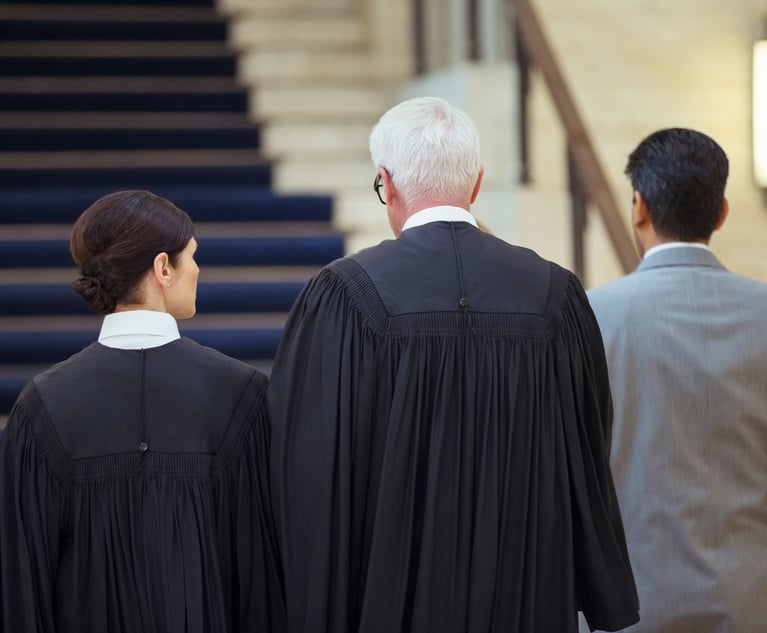Judicial Ethics Opinion 19-135
A town justice must not lobby the town board to adopt a policy prohibiting civil immigration arrests in the town court while a lawsuit challenging the legitimacy of such arrests in New York's courthouses remains pending or impending.
July 10, 2020 at 05:51 AM
5 minute read
The Advisory Committee on Judicial Ethics responds to written inquiries from New York state's approximately 3,600 judges and justices, as well as hundreds of judicial hearing officers, support magistrates, court attorney-referees, and judicial candidates (both judges and non-judges seeking election to judicial office). The committee interprets the Rules Governing Judicial Conduct (22 NYCRR Part 100) and, to the extent applicable, the Code of Judicial Conduct. The committee consists of 27 current and retired judges, and is co-chaired by former associate justice George D. Marlow of the Appellate Division and the Honorable Margaret Walsh, a justice of the Supreme Court.
Digest: A town justice must not lobby the town board to adopt a policy prohibiting civil immigration arrests in the town court while a lawsuit challenging the legitimacy of such arrests in New York's courthouses remains pending or impending.
Rules: 22 NYCRR 100.2; 100.2(A); 100.3(B)(8); 100.4(C)(1); 100.5(A)(1)(iii); Opinion 16-178.
Opinion: A town justice asks if he/she may publicly or privately lobby the town board to prohibit U.S. Immigration and Customs Enforcement (ICE) from conducting warrantless arrests in the town court. [1] Alternatively, the judge asks if he/she may advise the town board about the Office of Court Administration's policy concerning warrantless civil immigration arrests in state-paid courts and explain the reasons behind the policy. [2] We understand the ICE directive concerning civil arrests inside federal, state, and local courthouses is now the subject of a federal lawsuit, seeking to enjoin the practice as unlawful and unconstitutional. [3]
A judge must always avoid even the appearance of impropriety (see 22 NYCRR 100.2) and must always act to promote public confidence in the judiciary's integrity and impartiality (see 22 NYCRR 100.2[A]). Judges may publicly address issues involving the law, the legal system and the administration of justice (see 22 NYCRR 100.4[C][1]; 100.5[A][1][iii]), subject to generally applicable limitations on judicial speech and conduct. For example, a judge must "not make any public comment about a pending or impending proceeding in any court within the United States or its territories" (22 NYCRR 100.3[B][8]).
Clearly, policies concerning courthouse arrests are matters deeply affecting the law, the legal system and the system of justice. Indeed, that is essentially the premise of the pending federal lawsuit seeking to enjoin civil immigration arrests in and around New York State courthouses. The question here is thus which rule takes precedence: the prohibition on public comment on pending or impending cases, or a judge's allowable public speech on matters involving the law, the legal system and the administration of justice.
The Committee previously grappled with this issue in Opinion 16-178. We said a judicial association must not file an amicus brief with the Court of Appeals concerning a matter purportedly affecting the judiciary as a whole, where "it would be difficult, if not impossible," for the association to avoid the appearance of "impermissibly adopting 'the role of an advocate' [citation omitted]" (id.). We suggested the judicial association could instead seek a statutory change, albeit with a significant caveat (id.):
Finally, on these facts, there is a clear alternative to the judge and judicial association weighing in publicly on a specific pending case: they may propose legislative changes. … However, in so doing, they should be careful not to engage in impermissible public comment on the case currently before the Court of Appeals. … If it is not possible to advocate for a desired statutory change without publicly commenting on a specific, identifiable case, the judge and the judicial association must wait until the case is completely resolved.
Applying those principles here, we conclude this judge must not seek to convince the town board to adopt a policy concerning civil immigration arrests in the town court while a lawsuit concerning the legitimacy of such arrests in New York's courthouses remains pending or impending. The issues in this extremely high-profile and controversial lawsuit are identical to those the inquirer wishes to raise. Even if the judge never mentioned the federal lawsuit, it would be difficult, if not impossible, to avoid the perception that the judge was commenting on the case. On these facts, the judge's proposed alternative approach, of educating the town board concerning OCA's previously adopted policy on such arrests, is also impermissible until the federal case is completely resolved.
|[1] The town court is housed in a multi-purpose building that also serves as the town hall.
[2] OCA Directive 1-2019 was issued in April 2019, approximately 15 months after ICE Directive 11072:1.
[3] The State of New York and the District Attorney of Kings County filed a complaint for declaratory and injunctive relief against ICE, the Department of Homeland Security, and their respective heads, in September 2019.
This content has been archived. It is available through our partners, LexisNexis® and Bloomberg Law.
To view this content, please continue to their sites.
Not a Lexis Subscriber?
Subscribe Now
Not a Bloomberg Law Subscriber?
Subscribe Now
NOT FOR REPRINT
© 2024 ALM Global, LLC, All Rights Reserved. Request academic re-use from www.copyright.com. All other uses, submit a request to [email protected]. For more information visit Asset & Logo Licensing.
You Might Like
View AllTrending Stories
- 1Call for Nominations: Elite Trial Lawyers 2025
- 2Senate Judiciary Dems Release Report on Supreme Court Ethics
- 3Senate Confirms Last 2 of Biden's California Judicial Nominees
- 4Morrison & Foerster Doles Out Year-End and Special Bonuses, Raises Base Compensation for Associates
- 5Tom Girardi to Surrender to Federal Authorities on Jan. 7
Who Got The Work
Michael G. Bongiorno, Andrew Scott Dulberg and Elizabeth E. Driscoll from Wilmer Cutler Pickering Hale and Dorr have stepped in to represent Symbotic Inc., an A.I.-enabled technology platform that focuses on increasing supply chain efficiency, and other defendants in a pending shareholder derivative lawsuit. The case, filed Oct. 2 in Massachusetts District Court by the Brown Law Firm on behalf of Stephen Austen, accuses certain officers and directors of misleading investors in regard to Symbotic's potential for margin growth by failing to disclose that the company was not equipped to timely deploy its systems or manage expenses through project delays. The case, assigned to U.S. District Judge Nathaniel M. Gorton, is 1:24-cv-12522, Austen v. Cohen et al.
Who Got The Work
Edmund Polubinski and Marie Killmond of Davis Polk & Wardwell have entered appearances for data platform software development company MongoDB and other defendants in a pending shareholder derivative lawsuit. The action, filed Oct. 7 in New York Southern District Court by the Brown Law Firm, accuses the company's directors and/or officers of falsely expressing confidence in the company’s restructuring of its sales incentive plan and downplaying the severity of decreases in its upfront commitments. The case is 1:24-cv-07594, Roy v. Ittycheria et al.
Who Got The Work
Amy O. Bruchs and Kurt F. Ellison of Michael Best & Friedrich have entered appearances for Epic Systems Corp. in a pending employment discrimination lawsuit. The suit was filed Sept. 7 in Wisconsin Western District Court by Levine Eisberner LLC and Siri & Glimstad on behalf of a project manager who claims that he was wrongfully terminated after applying for a religious exemption to the defendant's COVID-19 vaccine mandate. The case, assigned to U.S. Magistrate Judge Anita Marie Boor, is 3:24-cv-00630, Secker, Nathan v. Epic Systems Corporation.
Who Got The Work
David X. Sullivan, Thomas J. Finn and Gregory A. Hall from McCarter & English have entered appearances for Sunrun Installation Services in a pending civil rights lawsuit. The complaint was filed Sept. 4 in Connecticut District Court by attorney Robert M. Berke on behalf of former employee George Edward Steins, who was arrested and charged with employing an unregistered home improvement salesperson. The complaint alleges that had Sunrun informed the Connecticut Department of Consumer Protection that the plaintiff's employment had ended in 2017 and that he no longer held Sunrun's home improvement contractor license, he would not have been hit with charges, which were dismissed in May 2024. The case, assigned to U.S. District Judge Jeffrey A. Meyer, is 3:24-cv-01423, Steins v. Sunrun, Inc. et al.
Who Got The Work
Greenberg Traurig shareholder Joshua L. Raskin has entered an appearance for boohoo.com UK Ltd. in a pending patent infringement lawsuit. The suit, filed Sept. 3 in Texas Eastern District Court by Rozier Hardt McDonough on behalf of Alto Dynamics, asserts five patents related to an online shopping platform. The case, assigned to U.S. District Judge Rodney Gilstrap, is 2:24-cv-00719, Alto Dynamics, LLC v. boohoo.com UK Limited.
Featured Firms
Law Offices of Gary Martin Hays & Associates, P.C.
(470) 294-1674
Law Offices of Mark E. Salomone
(857) 444-6468
Smith & Hassler
(713) 739-1250










